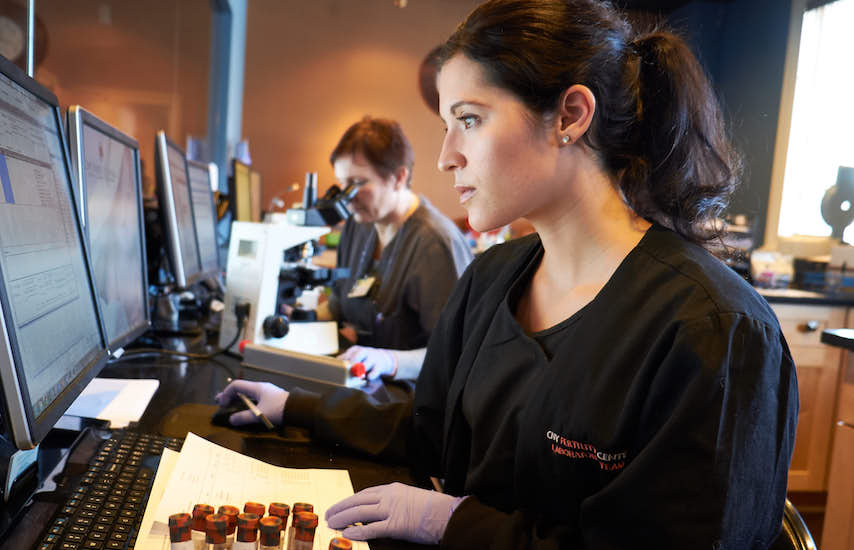Female Fertility Testing

People often want to know “what sort of fertility testing and evaluations should I have performed so I can know what is going on and receive the best care?” Sometimes, people may even be a little scared of their fertility testing. Know, however, that we are here to make sure your entire experience including your testing goes as smoothly as possible.
Basic Female Fertility Testing
Below is a list of the basic fertility testing that is usually completed before the start of your fertility treatment.
- Preconception blood work (yearly)
- Antibody Screen
- AMH
- Blood Type and Rh
- CBC (complete blood count)
- CMP (complete metabolic panel)
- Cystic Fibrosis
- Fragile X
- Hepatitis B Surface Antigen
- Hepatitis C Virus Antibody
- HIV-1/HIV-2 Antibody
- Prolactin
- Rubella IgG
- RPR
- SMA
- TSH (thyroid)
- Testosterone
- Varicella
- Vitamin D
- Imaging:
- Hysterosalpingogram (HSG) – an X-ray procedure that uses a contrast dye to evaluate the patency and health of a woman’s fallopian tubes. Commonly referred to as a dye test.
- Saline Sonohysterogram (SHG) – A transvaginal ultrasound with the slow introduction of saline solution into the uterus to evaluate uterine abnormalities and the endometrial (uterine) lining.
Baseline and Cycle Monitoring
This testing is done prior to starting any treatment cycle to get a “baseline” of all your hormonal levels. Some tests are continued throughout the treatment cycle during monitoring appointments.
- Estradiol: This test will be done routinely when you have a baseline ultrasound for injectable gonadotropins for Intrauterine insemination or Invitro Fertilization. Estradiol levels will also be monitored approximately every 2 days during the stimulation stage of your cycle.
- Progesterone: This test is performed when you have a baseline ultrasound for injectable gonadotropins for Intra-uterine insemination or Invitro Fertilization. It can also be performed during the midpoint of a patient’s cycle to help determine if the patient is pre-ovulatory or post-ovulatory. Progesterone levels are monitored during early pregnancy to ensure that the patient is producing adequate progesterone, or if supplements are required.
- LH (luteinizing hormone): This test is performed during the baseline and every monitoring appointment.
- FSH (follicle-stimulating hormone): This test is typically performed on Day 3 of the patient’s cycle to ascertain if the ovaries are functioning properly. An increase of FSH could mean that the patient is perimenopausal. This test will also be done when you have a baseline ultrasound for injectable gonadotropins for Intra-uterine insemination or Invitro Fertilization.
- HCG (pregnancy hormone): This test will be done when you have a baseline ultrasound for injectable gonadotropins for Intra-uterine insemination(IUI) or Invitro Fertilization(IVF). It will also be ordered after an IUI or IVF cycle to assess whether pregnancy was achieved. Once pregnancy has been established, hCG levels might be monitored the first 2-3 weeks depending on the levels of hormone present.
- TSH (thyroid): This test is performed at baseline.
- Physical exam and pelvic transvaginal ultrasound
Additional Testing
This infertility testing can be done at any time, but usually conducted after noteworthy signs of endom usually when determined it may be helpful by a physician
- Autoimmune testing for recurrent pregnancy loss or continuous IVF implantation failure may include: Lupus, NKC (natural killer cells), Karyotype (male and female), ANA (antinuclear antibody)
- Laparoscopy + Hysteroscopy –A surgical procedure done under anesthesia (general) to evaluate uterus for polyps, fibroids, endometriosis, and adhesions.

